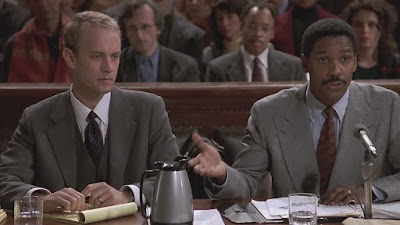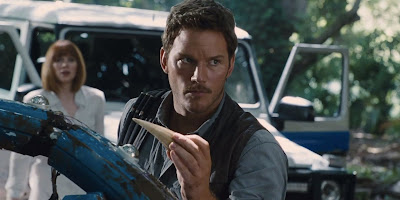“If it's in a word, or it's in a look, you can't get rid of ... The Babadook.”
“The Babadook” is a work of implicit realizations, of painful memories that rise to the surface when two wounded souls encounter a malevolent force lurking in the shadows of their home, and attempt to disarm it without understanding its underlying nature. Why has it drifted out of obscurity to stalk them? Most urban lore suggests that such beings exist because they feed on the negative emotions of others. It is the requirement of this plot, therefore, to tether the entity to those who represent the extremes of that value. Consider the deadened demeanor of Amelia (Essie Davis), who occupies space as a withdrawn woman incapable of escaping self-imposed isolation. That reality comes from a distant memory: the moment when, on the way to the hospital to deliver her son, her loving husband was killed while driving their car. She survived the crash, and so did the unborn son; years later, there is an indifference in her to the possibility of moving on, and her heart is frozen in a stasis of unending grief. Adding to that tragic implication is the personality of her son, whose wide traumatic eyes and shrill voice are the outlet for a very vivid imagination that believes ghosts and demons are always lurking under the bed. Watching him, one can only imagine what fate has in store for his adult years.
Saturday, June 27, 2015
Saturday, June 20, 2015
Inside Out / **** (2015)
Inside the mind of every teenage girl is a plethora of conflicting emotions struggling to find a meaningful balance. This is the narrative according to “Inside Out,” the newest Pixar film, which takes that dependable sense of adventure of animators, quite literally, into the head of one such young girl who is learning to deal with the tribulations of growing up. She has more than her fair share of reasons to doubt her own stability, too; a rather joyous sort who was perfectly happy in her Minnesotan hometown, she finds herself thrust into the realities of cross-country relocation to San Francisco, learning how to function in a new school (without friends), and living in a house where the narrow walls seem to create their own sense of anxiety. To suggest she feels like a stranger in her own life only scrapes the surface of the realization; her eventual detachment informs her perspective so thoroughly that her joyous demeanor quickly falls under the weight of conflicting feelings, all of them extreme. Many kids inevitably must walk the long mile of change when it comes to a family moving away from a sense of security, and yet how can poor confused Riley possibly rediscover her lost optimism, especially when everything she has ever known has been replaced by things so frighteningly foreign?
Friday, June 19, 2015
Zodiac / **** (2007)
The conventional sense is that serial killer films must almost always deal in certainties. While the details and underlying motives will be dynamic based on a specific vision, each detail comes to the screen with decisive clarity, as pieces of a puzzle that must always be assembled within the structure of a dependable formula. Sometimes, the root causes take on a deeper importance if one descends into the maw with more psychological considerations; in other examples, they are simply narrative obligations used to propel suspense or style. Our collective acknowledgment of this reality is so impenetrable that it becomes somewhat of a shocking revelation when a movie like “Zodiac” winds up moving into our sphere. After eight decades of dealing with a genre that has always been about an oblivious police force trying to solve the crimes of someone who is usually made the way they are because of childhood torment and social alienation, here is a film about fewer absolutes: confusion, frenzy of the masses, dead-ends, distant obsessions, silent warnings, patterns without consistency, false leads and gut feelings, and an instinct to suspect that maybe, just maybe, the real answers are right in front of us defying all procedural reasoning.
Sunday, June 14, 2015
Philadelphia / **** (1993)
There are two stories running parallel through the course of events in “Philadelphia”: one about a man dying of AIDS, and the other about a former colleague learning to find acceptance of alternate lifestyles. Their struggles converge early on in a moment that plays like accidental destiny, when one of them arrives at the office of the other in hopes that he will take on a case of wrongful termination. The scenario: Andrew Beckett (played by Tom Hanks) believes he was fired because of his illness, a factor that came to light suddenly after he was promoted high up into a law firm partnership. So few share in that perception, however, and when he arrives in the presence of the cynical Joe Miller (Denzel Washington), it is because all other possibilities have already been exhausted. Joe shares in that skepticism, but is also silently unnerved by the discomfort of being around a gay man dying of a contagious disease. But through scrupulous desires to take on big challenges, eventually he comes back around to representing the case, all while acknowledging that his client’s own death sentence is fated to be more than just a peripheral detail. That discovery is ultimately what gives added validity to these two intersecting lives, whose mutual wisdom and courage are made universal in a situation where an uninformed mind must ask itself: at what point must we overcome personal prejudice and realize that we all share the same right to live without persecution?
Thursday, June 11, 2015
Jurassic World / *** (2015)
The wisdom of Ian Malcom’s chaos theory ought to have inspired more heeded warnings in the “Jurassic Park” films, but sometimes tragedies are doomed to enter vicious cycles before higher influences catch on. In Steven Spielberg’s first of these outings, those words served as foreshadowing in a premise where man’s gift of scientific advancement became the tool for which he could recreate the dinosaurs from extinction, essentially for monetary gain. When a pair of paleontologists (and some skeptical investors) were then offered a chance to see those endeavors in a new theme park on a remote island in the Atlantic, it became the launch point for an elaborate nightmare of chases, accidents and skillful animatronics. It all began when security grids were compromised during a bad storm. Then electrical fences went down. Dinosaurs escaped their compounds. And at the height of it all, the eager visitors were all thrust into a situation where they had to act – and often quickly – in order to maintain their survival, if for no other reason than to ensure continuity for additional chapters.
Thursday, June 4, 2015
Poltergeist III / **1/2 (1988)
The high-rise is essentially a character all its own, with corridors and rooms and vast galleries that seem to permeate an aura of supernatural danger. That one prospect is what separates the much-maligned “Poltergeist III” from its predecessor, and all with good reason; whereas the first movie’s direct sequel often took the launch point of thrills and lost them in a haze of elaborate confusion and boredom, this movie – the last of the original franchise – isolates them in a single space where they could fester into something of underlying tension. Often, the key scares don’t amount to everything they should; that much is never in doubt. But because nearly all the attempts are gathered within an area that offers foreboding identity, that which does not amount to something lucrative still has the benefit of some peripheral creepiness. Was it by accident at all then that the director Gary Sherman, an enthusiast of B-movie horror well before his Hollywood undertakings, used ice as a conduit for a poltergeist’s violent obsessions? Or was it at all surprising that their dimension of malevolent unrest could be spied through the reflections of mirrors, as if they had always been windows into their nightmarish intentions?
Subscribe to:
Posts (Atom)






